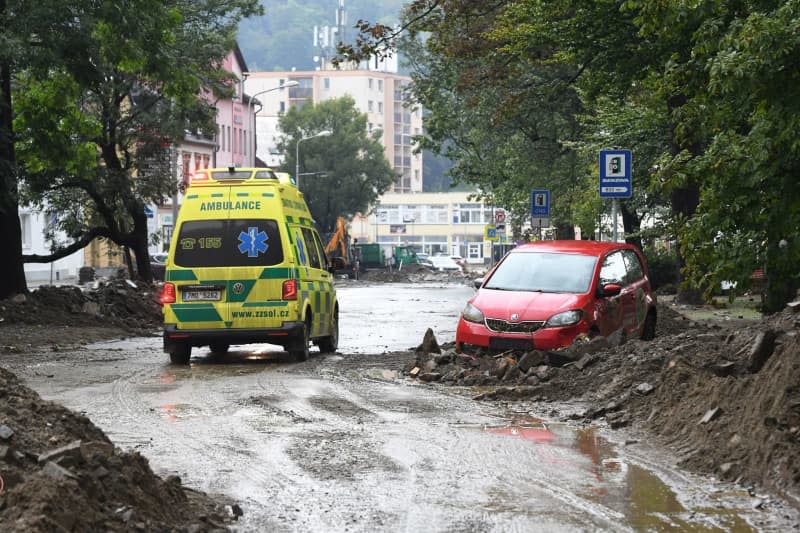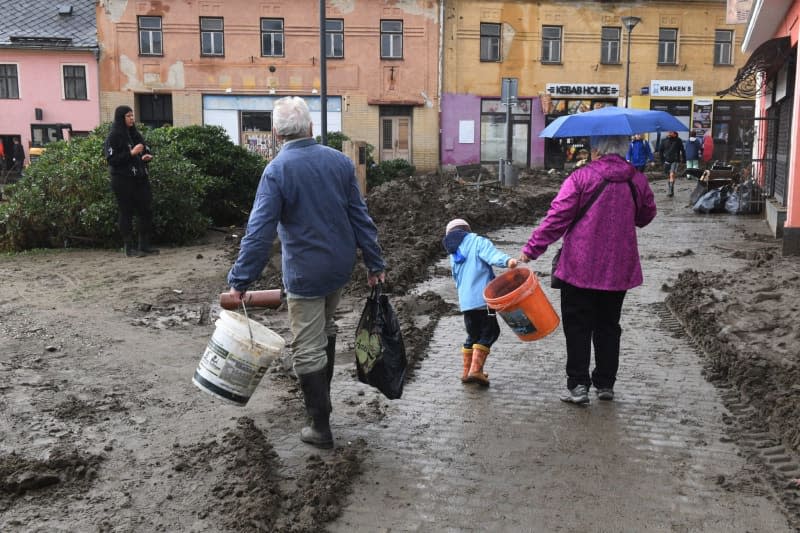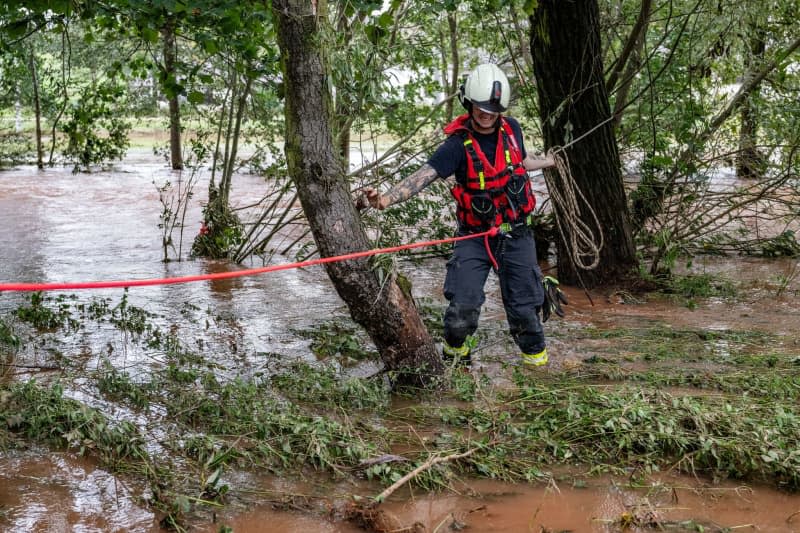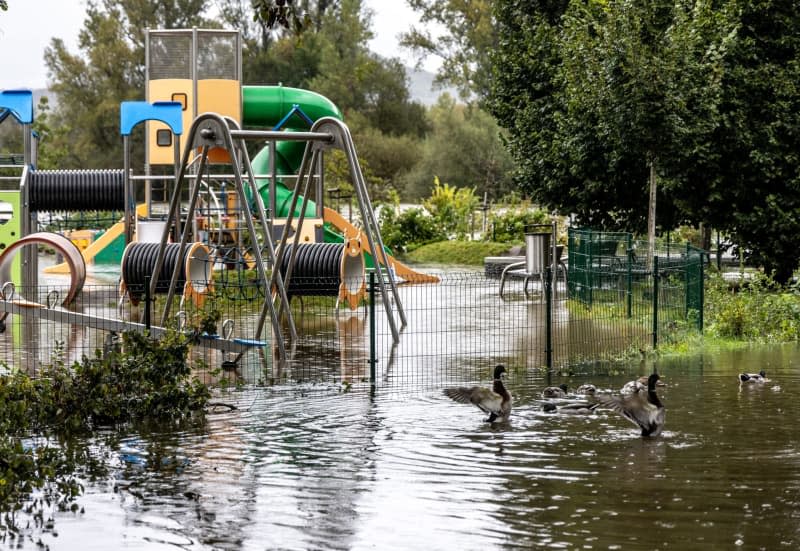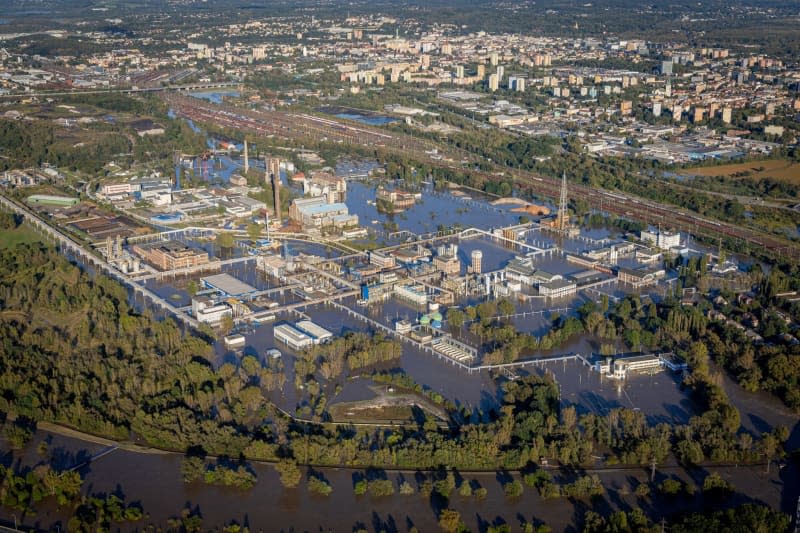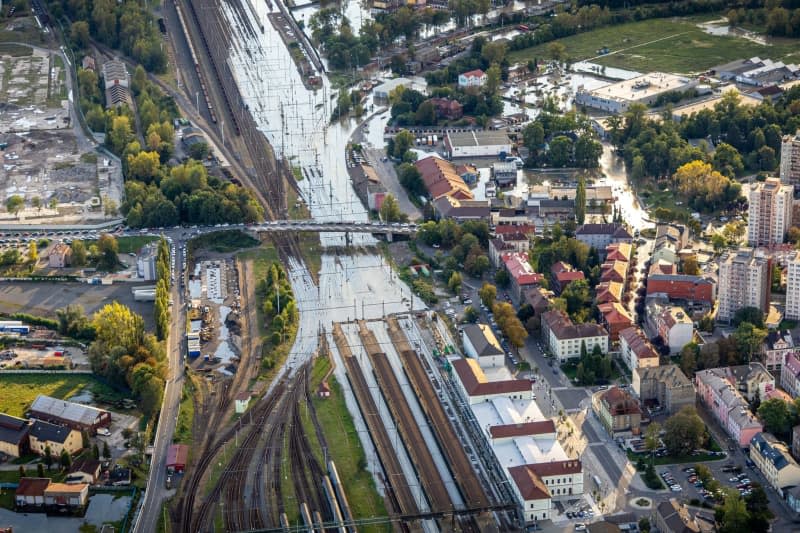The death toll from severe flooding in central and eastern Europe climbed to 16 on Monday, with more heavy rains on the way.
More than a dozen casualties have now been confirmed across Austria, Poland, the Czech Republic and Romania in the floods that began inundating the region over the weekend, with the toll expected to continue rising.
In large parts of the extensive disaster zone, kilometres of land remain submerged, with roads and field flooded, basements and houses filling with water and dams and dykes overwhelmed.
In Poland, authorities said on Monday afternoon that three men and one woman have died in separate incidents across the affected regions, bringing the total death toll in the country to five.
The latest developments saw the mayor of the small south-western town of Paczków order a compulsory evacuation after a crack appeared in the wall of a nearby reservoir.
Mayor Artur Rolka warned that “no one can guarantee that the damage will not worsen” in an appeal on social media and said on Polish television that he decided on a compulsory evacuation after residents failed to heed his calls for them to leave their houses voluntarily.
He called on all remaining residents to leave low-lying districts which could soon be overrun by floodwaters after days of historic rainfall.
An immediate evacuation was also ordered in Nysa, another town in the Opole region with more than 40,000 inhabitants which had seen dramatic scenes on Sunday as 33 patients were rescued from the local district hospital in rubber dinghies.
The situation in Nysa had initially seemed under control on Monday, but sirens later wailed through the town and television footage showed long queues of cars on the city’s bridges after the mayor warned that a dyke could breach and flood the city.
“The situation is very dangerous, the health and lives of the residents are at risk,” said a statement from the city.
After an emergency Cabinet meeting in the western city of Wrocław on Monday, Polish Prime Minister Donald Tusk announced 1 billion zloty ($260 million) in aid for victims of the flooding.
Tusk said he would speak to his counterparts in Austria, the Czech Republic and Slovakia about jointly seeking European Union funding to help with reconstruction efforts.
Those affected by the flooding can submit applications for funds to municipal administrations with immediate effect, the prime minister said.
Tusk also addressed reports of looting in flooded areas, promising to take tough action against perpetrators exploiting the plight of those affected by the flooding.
Further downstream, Wrocław is preparing to be hit with high water later this week, Mayor Jacek Sutryk said on Monday morning.
There is round-the-clock monitoring of flood dykes as well as the canals and tributaries of the Oder river, which runs through the city, Sutryk said in a video posted on Facebook.
Flooding is currently expected to reach Wrocław on Wednesday, with earlier forecasts suggesting the city could avoid the worst of the weather being revised, the mayor warned.
However, the flooding is not anticipated to reach the level of the catastrophic conditions of 1997, when one-third of the city was inundated.
Three dead in Lower Austria
The latest victims in Austria included two elderly men who died in their homes in the flood-hit state of Lower Austria, which has been declared a disaster zone by the national government.
The flood situation in the eastern region – which surrounds the capital Vienna and borders the Czech Republic – is still serious despite a brief let-up in rain overnight, Governor Johanna Mikl-Leitner said on Monday.
“It is not over, it remains critical, it remains dramatic,” Mikl-Leitner added.
Up to 80 millimetres of rain were expected in the state on Monday, putting significant pressure on the region’s dams.
More than 200 roads in Lower Austria are closed, 1,800 buildings have been evacuated and many pupils were staying at home, she said.
Around 3,500 households are currently without electricity.
In Lower Austria, up to 370 millimetres of rain have fallen in recent days, several times the monthly average of precipitation. A firefighter lost his life while pumping out a basement over the weekend.
The situation could ease somewhat from Tuesday, when an end to the persistent rain is forecast.
One dead, seven missing in Czech ‘apocalypse’
The Czech Republic confirmed on Monday its first death from the flooding, while reporting up to seven people missing.
Czech Police President Martin Vondrášek said an individual drowned in the small Krasová river in the eastern Moravian-Silesian region.
Three of those missing are believed to have been trapped in a car when it got caught in a raging river near the spa town of Jesenik, near the border with Poland. There is no trace of the vehicle so far.
The other missing persons are said to have fallen into various bodies of water, such as the Otava river. Additionally, a man from a nursing home near the Polish border is missing.
Czech Prime Minister Petr Fiala has described the situation as a once-in-a-century flood.
Over the weekend, streets in town like Jesenik in the Altvater Mountains, Opava on the river of the same name and Krnov on the border with Poland turned into raging torrents.
In Jesenik, emergency services rescued hundreds of people with boats and helicopters. The mayor of the town said on television: “It was an apocalypse, there is mud everywhere, everything is destroyed.”
The main square in the city centre temporarily turned into a single body of water, with cars floating on it. Several houses collapsed in the region, while authorities reported a risk of landslides after the floodwaters receded.
On the Morava river, entire streets were underwater in Litovel, the CTK news agency reported. Authorities in the small town of almost 10,000 residents appealed to the population to heed the emergency services.
Levels continued to rise in many other places. Evacuation orders have been expanded in Ostrava, the third-largest city in the Czech Republic after dykes were breached. A state of danger was declared for the area around the town of Frýdlant in North Bohemia.
Casualties in Romania as Orbán cancels obligations
Other countries have also been affected by the historic storm front, with Hungarian President Viktor Orbán announcing on the social media platform X that he has postponed all “international obligations” due to “extreme weather conditions and the ongoing floods in Hungary.”
As Germany prepares for swollen rivers to bring flooding to its border regions, the government in Berlin pledged support to countries coping with the flooding should they ask for help.
German Chancellor Olaf Scholz said the floods were “distressing,” adding: “We will help as much as we can.”
The worst-hit country so far is Romania, where at least seven people are now known to have died in heavy rain and severe flooding since the weekend.
The regions of Galați, Vaslui and Iași in the east of the country were particularly hard hit. About 300 people had to be evacuated, and around 6,000 farmhouses were impacted by the flooding.
The water mostly affected remote villages, where people climbed onto rooftops to avoid being swept away by the floods.
